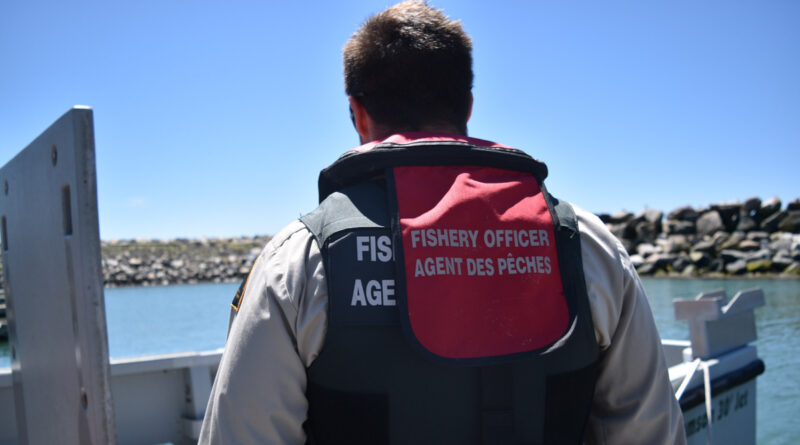DFO “structurally and culturally” unable to oversee aquaculture
In the divisive debate over aquaculture in Canada, anti-fish farm activists and seafood farmers seem to agree on one issue – the Department of Fisheries and Oceans has to go
By Fabian Dawson
SeaWestNews
Canada’s seafood farmers are calling for the “explicit identification of a federal department” that will champion and grow the aquaculture industry in the country.
“The Department of Fisheries and Oceans (DFO) seems structurally and culturally unable to do this,” said the Canadian Aquaculture Industry Alliance (CAIA), in an open letter to Prime Minister Justin Trudeau.
“Without a significant new commitment to change in the department, another department must be given the responsibility to champion our sector,” stated the letter, signed by Jennifer Woodland, chair of CAIA and Timothy Kennedy, president and CEO of CAIA.
“Effective federal leadership will bring multiple interests together to develop a vision, strategy and plan for the sustainable growth of aquaculture across Canada. Your government can still do this, and realize the clear opportunity for Canada to be a global leader.
“However, to date, and despite good-faith constructive efforts by our sector, your government has not delivered one positive structural or program change for the aquaculture sector that supports growth,” they said.
CAIA is the national association that speaks for Canada’s seafood farmers representing a membership that generates over $6 billion in economic activity, $2.45 billion in GDP and employs over 25,000 Canadians.
The letter, comes in the wake of a government decision, driven by anti-fish farm activism, to phase out salmon farms in the waters of BC’s Discovery Islands. Initial industry estimates show that the closures will result in 1,498 job losses primarily in Vancouver’s North Island region and will impact about 700 businesses that service the farms.
Bernadette Jordan, Canada’s Minister of Fisheries and Oceans, made the decision without the input of the industry and local mayors and at the expense of science, including nine peer reviewed scientific studies which showed that salmon farms in the area, had only minimal impact on wild stocks migrating through the waters off Discovery Islands.
CAIA described the decision as superficial saying the aquaculture industry was only given a single short opportunity to speak with the Minister and local communities were not granted any meeting.
“Minister Jordan’s decision on the Discovery Islands, one week before the holidays, at the end of an unprecedented year of emotional and social upheaval and stress, is a terrible blow to the sector’s positive aspirations.
“The stress for our federally and provincially recognized “essential” employees, already at a high with COVID-19, has been severely exacerbated by this decision. We are deeply concerned for the present mental and physical health of our British Columbia employees, their families and their futures,” the letter stated.
Pointing out that countries like the United States, China, and Russia, have aggressive plans to develop their marine aquaculture sectors, CAIA said aquaculture represents the future of reliable seafood production for Canada as it will reduce pressure on wild stocks.
“Marine farm-raised Atlantic salmon sector is close to 90 per cent of the value of the entire aquaculture sector in Canada.
“It is the anchor from which the total sector – shellfish, seaweeds, new marine and land-based technologies – can develop and thrive. Our recent market research for Canada revealed that salmon (the vast majority of which is farmed Atlantic salmon) is by a large margin the top seafood choice of Canadians, making up more than 30 per cent of their seafood diet, and even more importantly, Canadians (and the world) want more Canadian Atlantic salmon.
“It is also the key for coastal job growth where there are few other jobs,” CAIA added.
In the divisive debate over salmon farming in British Columbia, the call for a new independent federal agency to oversee the aquaculture industry, is the one issue both seafood farmers and anti-fish farm activists seem to agree on.
In an opinion piece headlined The biggest threat to wild Pacific salmon is Fisheries and Oceans Canada published last October, BC multimillionaire, Tony Allard, who has been in the forefront of activism to oust fish farmers from the ocean, accused DFO of rigging science to support the aquaculture industry.
“In 2018, the auditor general found DFO was woefully behind in its risk assessments, was not enforcing aquaculture regulations, and was “vulnerable to claims that it prioritized the aquaculture industry over the protection of wild fish.”
“The same year, Canada’s chief scientist recommended DFO have unbiased advice from an external advisory committee. Still, no external oversight exists,” he wrote.
Other groups like the David Suzuki Foundation and the Watershed Watch Salmon Society have also criticized DFO claiming, without evidence, that it is in collusion with the aquaculture industry.
In response to the criticisms DFO told SeaWestNews in an email: “We recognize that as the industry grows, the rules and regulations need to grow with it. That is why our government is developing Canada’s first ever Aquaculture Act. While respecting provincial and territorial jurisdictions, this Act will provide more certainty and continuity related to the technologies, environmental impacts, and the regulatory regime within the industry.
“In regards to British Columbia, we have also been clear that we are working on a transition for open-net pens by 2025. A change like this requires cooperation, consultation, and engagement. We will take the necessary time and work with all those affected to develop a plan that is environmentally-responsible, workable, economically feasible, and takes into account social considerations. In early 2021, we will be engaging with industry, provincial counterparts in B.C., and Indigenous communities, and talking with other key stakeholders in B.C. on this important undertaking.”
(Image courtesy DFO)

